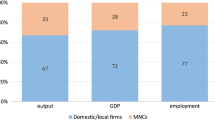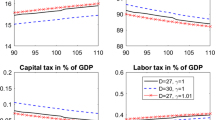Abstract
The standard tax theory result that investment should not be distorted is based on the assumption that profits are locally bound. In this paper, we analyze the optimal tax policy in a model where firms are internationally mobile. We show that the optimal policy response to increasing firm mobility may be taxation, subsidization, or non-distortion of the marginal investment, depending on whether the mobile firms are more or less profitable than the average firm in the economy. Our findings may contribute to understanding recent tax policy developments in many OECD countries.
Similar content being viewed by others
References
Auerbach, A. J. (2007). Why have corporate tax revenues declined? Another look. CESifo Economic Studies, 53(2), 153–171.
Baldwin, R., & Okubo, T. (2009). Tax reform, delocation and heterogeneous firms. The Scandinavian Journal of Economics, 111(4), 741–764.
Barba Navaretti, G., & Venables, A. J. (2004). Multinational firms in the world economy. Princeton: Princeton University Press.
Bayindir-Upmann, T., & Ziad, A. (2005). Existence of equilibria in a basic tax-competition model. Regional Science and Urban Economics, 35(1), 1–22.
Boadway, R., Cuff, K., & Marceau, N. (2002). Inter-jurisdictional competition for firms. International Economic Review, 43(3), 761–782.
Bond, S. R. (2000). Levelling up or levelling down? Some reflections on the ACE and CBIT proposals, and the future of the corporate tax base. In S. Cnossen (Ed.), Taxing capital income in the European union. Issues and options for reform (pp. 161–179). Oxford: Oxford University Press.
Davies, R., & Eckel, C. (2010). Tax competition for heterogeneous firms with endogenous entry. American Economic Journal: Economic Policy, 2(1), 77–102.
Devereux, M. P., Griffith, R., & Klemm, A. (2002). Corporate income tax reforms and international tax competition. Economic Policy, 17(2), 450–493.
Fuest, C. (2005). Economic integration and tax policy with endogenous foreign firm ownership. Journal of Public Economics, 89(9–10), 1823–1840.
Fuest, C., & Hemmelgarn, T. (2005). Corporate tax policy, foreign firm ownership and thin capitalization. Regional Science and Urban Economics, 35(5), 508–526.
Gordon, R. H. (1986). Taxation of investment and savings in the world economy. The American Economic Review, 76(5), 1086–1102.
Gordon, R. H. (1992). Can capital income taxes survive in open economies? Journal of Finance, 47(3), 1159–1180.
Haufler, A., & Schjelderup, G. (2000). Corporate tax systems and cross country profit shifting. Oxford Economic Papers, 52(2), 306–325.
Haufler, A., & Stähler, F. (2009). Tax competition in a simple model with heterogeneous firms: how larger markets reduce profit taxes. CESifo working paper No. 2867.
Helpman, E., Melitz, M. J., & Yeaple, S. R. (2004). Export versus FDI with heterogeneous firms. The American Economic Review, 94(1), 300–316.
Hong, Q., & Smart, M. (2007). In praise of tax havens: international tax planning and foreign direct investment. CESifo working paper No. 1942.
Hong, Q., & Smart, M. (2010). In praise of tax havens: international tax planning and foreign direct investment. European Economic Review, 54(1), 82–95.
Huizinga, H., & Nielsen, S. B. (1997). Capital income and profit taxation with foreign ownership of firms. Journal of International Economics, 42, 149–165.
Janeba, E., & Smart, M. (2003). Is targeted tax competition less harmful than its remedies? International Tax and Public Finance, 10(3), 259–280.
Keen, M. (2001). Preferential regimes can make tax competition less harmful. National Tax Journal, 54(4), 757–762.
Lipsey, R. E. (2001). Foreign direct investment and the operations of multinational firms: concepts, history and data. NBER working paper No. 8665.
Melitz, M. J. (2003). The impact of trade on intra-industry reallocations and aggregate industry productivity. Econometrica, 71(6), 1695–1725.
Osmundsen, P., Hagen, K. P., & Schjelderup, G. (1998). Internationally mobile firms and tax policy. Journal of International Economics, 45(1), 97–113.
Ottaviano, G. I. P., & Thisse, J.-F. (2003). Agglomeration and economic geography. CEPR discussion paper No. 3838.
Ottaviano, G. I. P., & Thisse, J.-F. (2004). Agglomeration and economic geography. In Handbooks in Economics. Volume 4. Cities and geography: Vol. 7. Handbook of regional and urban economics (pp. 2563–2608). Amsterdam: Elsevier.
Richter, W., & Wellisch, D. (1996). The provision of local public goods and factors in the presence of firm and household mobility. Journal of Public Economics, 60, 73–93.
Sinn, H.-W. (1990). Tax harmonization and tax competition in Europe. European Economic Review, 34(2–3), 489–504.
Slemrod, J. (2004). Are corporate tax rates, or countries, converging? Journal of Public Economics, 88(6), 1169–1186.
Steinmo, S. (2003). The evolution of policy ideas: Tax policy in the 20th century. British Journal of Politics and International Relations, 5(2), 206–236.
Swank, D., & Steinmo, S. (2002). The new political economy of taxation in advanced capitalist democracies. American Journal of Political Science, 46(3), 642–655.
Whalley, J. (1990). Foreign responses to US tax reform. In J. Slemrod (Ed.), Do taxes matter? The impact of the tax reform act of 1986 (pp. 286–314). Cambridge: MIT Press.
Wilson, J. D., & Wildasin, D. E. (2004). Capital tax competition: Bane or boon. Journal of Public Economics, Special Issue, 88(6), 1065–91.
Author information
Authors and Affiliations
Corresponding author
Additional information
We thank J. Wilson and an anonymous referee as well as G. Schjelderup and participants at various research workshops for very helpful comments. All remaining errors are our own. We gratefully acknowledge financial support from the Deutsche Forschungsgemeinschaft (DFG), Grant No. FU 442/3-1, and the ESRC, Grant No RES -060-25-0033.
Rights and permissions
About this article
Cite this article
Becker, J., Fuest, C. Optimal tax policy when firms are internationally mobile. Int Tax Public Finance 18, 580–604 (2011). https://doi.org/10.1007/s10797-011-9168-x
Published:
Issue Date:
DOI: https://doi.org/10.1007/s10797-011-9168-x




